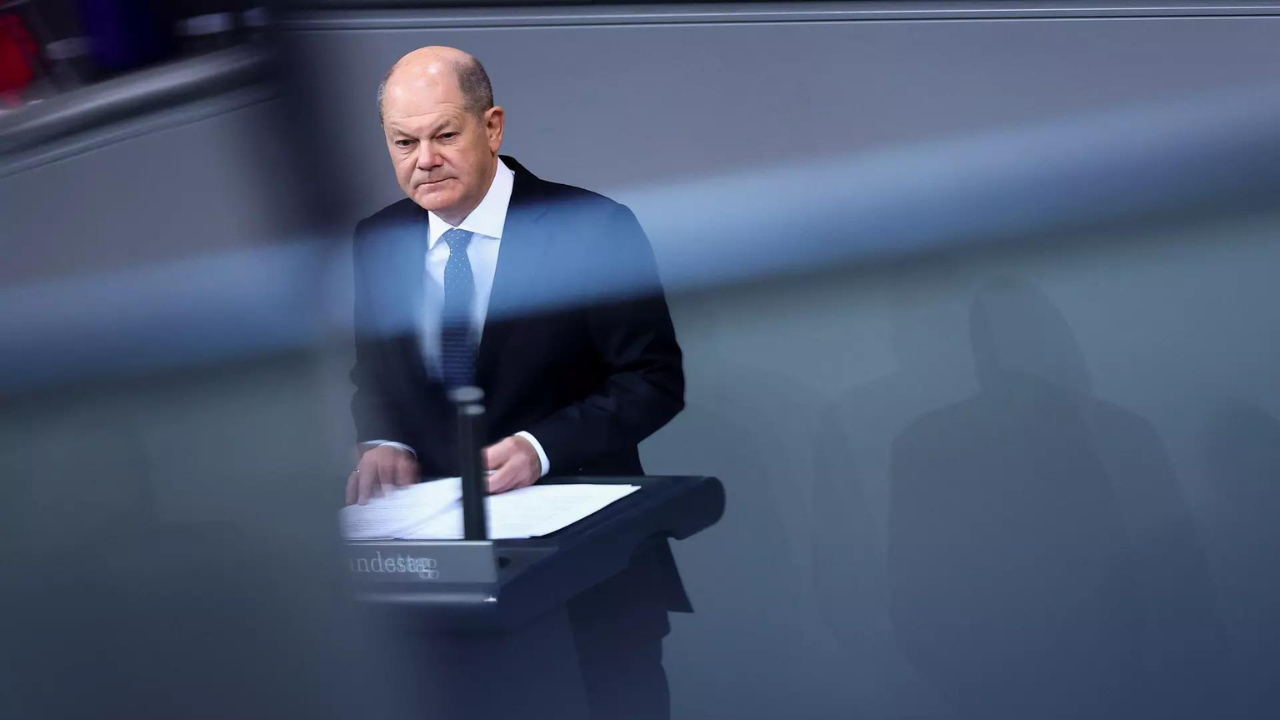[ad_1]
BERLIN: Chancellor Olaf Scholz on Tuesday sought to reassure the German individuals and companies that his authorities would modernise the economic system and assist very important industries akin to chip factories, regardless of a courtroom ruling that tore a gap within the federal price range. A constitutional courtroom ruling almost two weeks in the past blocked the federal government’s plans to reallocate unused pandemic funds in direction of inexperienced initiatives and trade assist, elevating fears Germany’s economic system could possibly be additional weakened. The decision additionally known as into query Germany’s historically strict fiscal coverage and sparked warnings that firms could possibly be starved of assist to maintain them globally aggressive towards subsidies provided elsewhere. Talking to parliament as he grapples with a disaster that has shaken his coalition authorities, Scholz referenced the Covid pandemic, the warfare in Ukraine and hovering power costs. “It could be a grave and unforgivable mistake to neglect the modernisation of our nation within the face of all these acute challenges,” Scholz advised the Bundestag in a 25-minute speech. The nation’s federal states had the best curiosity in securing funding in areas akin to semiconductors, climate-friendly metal manufacturing and battery vegetation, he stated, addressing issues of particular industries who worry shedding out. Scholz stated the federal government would finish a scheme to cap power costs by the tip of this yr, however promised to behave rapidly if costs shot up once more. Nonetheless, he left open the query of whether or not the federal government would attempt to droop Germany’s constitutionally enshrined debt brakes once more in 2024, which some in his coalition and union members known as for however the opposition would possibly problem in courtroom. Scholz stated his authorities was working with parliament to attract up a 2024 price range “as rapidly as attainable” that might embody spending curbs. Scholz’s assurances that his authorities would resolve the price range disaster with care had been met with jeers and laughter from the opposition Christian Democrats (CDU), whose lawsuit towards the federal government had sparked the sooner courtroom ruling. “I do not know learn how to interpret your laughing there,” stated Scholz, who in English invoked the tune “You may By no means Stroll Alone” to reassure Germans of the federal government’s assist by means of troublesome occasions. He underscored assist for Ukraine, after the current price range turmoil raised questions over how a lot navy assist Berlin was prepared to commit. Scholz’s authorities has pledged to double assist to eight billion euros ($8.76 billion) subsequent yr. “It is usually clear that we should not let up in our assist for Ukraine and in overcoming the power disaster. That will not be accountable, that will endanger our future,” he stated. Overseas Minister Annalena Baerbock later advised a NATO assembly in Brussels that Germany would carry its defence spending as much as the alliance’s goal of two% of gross home product subsequent yr. CDU chief Friedrich Merz accused Scholz’s authorities of a brazen try to avoid borrowing guidelines and stated its behaviour risked undermining the European Union’s wider fiscal reforms in upcoming negotiations. “If the dams burst in Germany, they may also not maintain in all different nations within the foreign money union,” Merz stated. “Germany has a operate as a task mannequin there and that you must realise that, whether or not you prefer it or not.” Germany had a debt-to-GDP ratio of 65% in 2022, in contrast with 117% for France, 148% for Italy and 116% for Spain, OECD information present. Hendrik Wuest, CDU premier of the state of North Rhine-Westphalia, stated the federal government had ruined Germany’s popularity as an anchor of stability in simply two years. “The worldwide injury is big,” he advised the Rheinische Put up newspaper. Recollections of how frugality paved the best way for postwar reconstruction and the way expensive it was to re-integrate indebted ex-communist East Germany have formed a uniquely debt-averse political tradition. In an effort to maintain supporting trade, Finance Minister Christian Lindner has dominated out tax rises and stated financial savings must be discovered elsewhere, backed up by welfare reforms. The recognition of Scholz’s coalition has sagged throughout a interval of weak financial efficiency, rising inflation and better rates of interest. However providing some reprieve, a brand new survey by Forsa prompt solely simply over a 3rd of Germans consider a CDU-led authorities might do a greater job of fixing the price range disaster than the ruling coalition, whereas 59% didn’t.
[ad_2]
Source link


